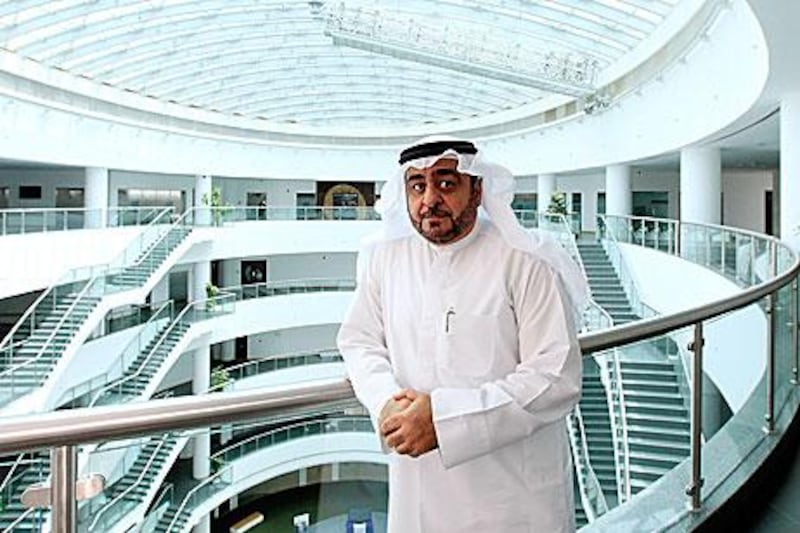ABU DHABI // The Ministry of Higher Education has warned students to check with it before starting internet courses, after complaints about unaccredited degrees from an online university actively recruiting in the UAE.
Dr Bader Aboul-Ela, director of the commission for academic accreditation at the ministry, said Must University is granting degrees to students who later found difficulty in having them attested.
"We tell them they should have consulted us first," Dr Aboul-Ela said. "For any Emirati to get their online degree attested they have to get a no-objection from us before they commence. It’s for their own protection."
The university has claimed to be affiliated with Dubai and Abu Dhabi health authority hospitals and said the organisations were attesting and licensing the school’s degrees in health sciences.
But neither authority accepts online degrees in any specialisation.
Must University says it offers degrees including nursing and business and is offering scholarships to attract UAE students with claims that they can "leave financial constraints behind".
The university’s scholarship manager, Roy Miller, said about 15,000 students from the UAE had taken courses at Must, adding about 500 had graduated and 110 were working in the country’s medical sector.
Mr Miller said the school’s affiliation with the UAE goes back 10 years and students were initially recruited at an education exhibition in 2010.
The school is offering a bachelor’s degree in nursing at a cost of US$2,300 (Dh8,448), plus $199 registration fee, instead of the usual $14,400 and $499.
Mr Miller said the degree could be completed on the student’s own time schedule.
He also named a number of hospitals where nursing students can do laboratory time, including Sheikh Khalifa Medical City and the American European Medical Centre in Abu Dhabi, and Latifa Hospital in Dubai.
All three said they had no connection with the university.
Ahmed Al Zarooni, director of medical licensing at the Ministry of Health, said the ministry did not recognise online degrees or accept distance learning for clinical practices.
“No place in the world would accept this," Mr Al Zarooni said. "These subjects are applied sciences and students need to learn them practically in a real, live setting."
The ministry accepts degrees from the Hamdan Bin Mohammed e-University in Dubai, but only for administrative roles.
"We do not accept any online clinical degrees," Mr Al Zarooni said. "We're talking about people's lives."
Must is listed by the state of Oregon as lacking "appropriate approval or accreditation", state education authorities say.
The university is not accredited by any internationally recognised association.
Neither the institution nor its accrediting body, the International Accreditation Organisation (IAO), is on the US list of 3,000 accredited institutions drawn up by the Council for Higher Education Accreditation (Chea).
Mr Miller said the university was "internationally accreditated", which he said was better than anything from the recognised bodies.
The school is not listed on any Chea list, and Dr Aboul-Ela said IAO had "set up an office in Dubai in one of the free zones. It should be shut down. Our warning to students is to go and look carefully at the accreditation of the university".
At least one academic listed as being affiliated with the school said he had never heard of it.
Dr Friedrich Schneider, a well-known economist and chair of the department of economics at Johannes Kepler University in Austria, has complained to the IAO for using his name on their brochure.
In April, the Ministry of Higher Education and Scientific Research warned students against unaccredited online programmes.
Its rules require students to obtain ministry approval before enrolling in any educational institution, at home or overseas.
The ministry does not recognise distance-education courses offered by overseas institutions, and foreign study should be supervised by a UAE cultural attache or embassy staff.
Students unsure of a university’s credentials can check with the US Embassy’s EducationUSA office in Abu Dhabi, or the Chea website.
Robert Arbuckle, public affairs officer at the US Embassy, warned against signing up with any organisation that used "high-pressure sales tactics".
Mr Arbuckle also cautioned prospective students to look out for ".com" addresses, denoting a company operating for profit, rather than the ".edu" suffix.
"Some sources believe that up to 200,000 people a year may be receiving one of these useless degrees, making it, potentially, a billion-dollar industry," Mr Arbuckle said.
He said Must was one of the online universities about which the embassy received the most enquiries.
The National encountered aggressive sales tactics when posing as a potential student.
Using online chat, the university’s representative asked several times how the student would be paying and when.
Dr Rahul Choudaha, director of research at World Education Services, a New York education think tank, said that while e-learning serves a vital need, it is also a chance for some institutions to pull students into programmes that are "substandard and unaccredited".
Dr Choudaha said it could be hard to tell unaccredited universities from those that are accredited.
Institutions have in recent years turned to US accrediting bodies to lend credibility to online courses. And those bodies have "been trying to adapt to the fast-evolving mode and reach of online delivery", he said.
Dr Mansoor Al Awar, chancellor of Hamdan Bin Mohammed e-University, said the Government had issued many warnings about degree problems in recent years.
"It's that time of year when students are thinking about university and it's always been an issue," Dr Al Awar said.
Ministry conditions for online study in the UAE are strict. It requires students enrolled at Hamdan Bin Mohammed to attend in person for two years before studying remotely.
Mr Miller said the school had a "money-back guarantee" if students' diplomas were not recognised.
mswan@thenational.ae
* With additional reporting by Zaineb Al Hassani, Manal Ismail and Afshan Ahmed






